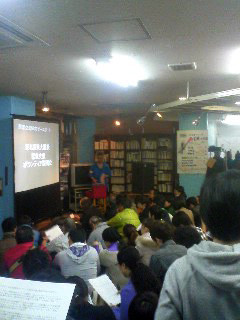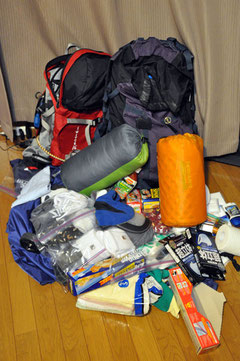At 9:30 tonight, I handed a tent lock, a solar-powered cell phone charger, two ground sheets, fifty wet-wipes, twelve liters of water, and six chocolate bars to my betters, and then I walked away.
In the last two days, three weeks of unerring certainty came crashing down.
Perhaps I should rewind to the beginning.
On March 30th, the day before I went back to work, I attended an orientation session at the Peace Boat headquarters in Takadanobaba. They were sending teams of volunteers for one-week tours in Ishinomaki, Miyagi, which has been hit hard by the tsunami.
The Peace Boat was, to my knowledge, the first group to be sending ordinary volunteers to the disaster area. Ours would be the third troop to go; the second troop was to leave on April 1st.
Roughly 250 people squatted in the basement office in Takadanobaba, squeezing more and more tightly together as still more people filtered in. Foreigners were advised to converge into one corner so that they could all hear the interpreters during the Japanese presentation.

We first heard from Mr. Yamamoto, the Peace Boat’s veteran disaster-zone advance scout. He had been in Ishinomaki since March 17th, and he described the scene via cell phone. He said the situation was far worse than the 1995 Kobe Earthquake, with initial chaos in the evacuation centers, where no resources had been available for the first week. Food and other donations were now arriving, though some people in outlying areas were not getting the help they needed. There was absolutely no gas in the isolated town, so nobody was able to drive anywhere to get resources on their own.
The key role for volunteers, he said, was mud removal. It was waist-deep. Volunteers had already helped to clear an elementary school gymnasium so that the students could hold their graduation ceremony. He signed off by adding, “It’s cold. It’s unbelievably cold.”
Though the Peace Boat has applied for access to other areas, the city of Ishinomaki is presently the limit of their mission. There are 170 evacuation centers in Ishinomaki, plus a number of people hunkered down in the livable areas of their houses, as well as some living in their cars to protect the one earthly possession they have left.
Peace Boat volunteers are making 2000 meals per day, which is still only one meal per day for each evacuee. We were warned that the situation was much worse than it appeared on TV, and that the waist-deep mud was full of nails and broken debris. Rather than hiking boots, knee-high rubber boots were ideal. “Be prepared to get covered in mud,” we were advised.
They estimated that volunteers would be needed for another three months. While the Peace Boat is limiting its tours to one week at a time, those who wanted to volunteer longer were encouraged to talk to local Social Welfare Committees or to check out the Japan Civil Network.
Finally, they asked everyone who could not commit to departing on April 8th to leave. I had hoped to go on the 1st, but it seemed that the last orientation for that session had been on March 27th, when I had been in Osaka. I knew I had three rehearsals for my next play on the week of the 8th, but I also knew I wouldn’t be able to sit still until I felt that I’d done something directly. So I stayed.
To count the number of people remaining, they asked us to make groups of five, and we found that there were about 130 of us left. Without further ado, they told us that these would be our groups for the trip. We were given a rather unspecific list of things to bring, then sent on our way while our chosen group leader attended a supplementary session.
One of my group members was a 64-year-old who’d gone to elementary school in Ishinomaki. He looked ready to go.
We had to bring all of our own food and water, though no recommendation was made as to precise quantities of either. All we had to go by was that the minimum physical requirement was the ability to carry 30 kg. I was pleased, however, to put my winter camping knowledge to use by explaining the key kinds of clothing to bring and avoid. Many Japanese people don’t know about the heat-loss-through-the-head rule, or that jeans are a bad idea for wet work.
Over the next week and a half our group shared e-mails almost daily, with notices from our leader often taking the form of long Japanese essays that required rather a lot of translation work on my part. Until two days before departure, we still didn’t know exactly what time we were leaving or what time we’d be heading back, which added uncertainty about quantities of food and water. There was also the question of whether we’d be digging latrines, using port-a-potties, or bagging waste out. With fifty people per bus, we had to keep baggage light and compact, but there was so much we could only estimate.
Having finally settled on 10 liters of water each, every morning I swung by a grocery store on the way to work to pick up one of their tightly-rationed 2L bottles before they sold out.
I spent both days last weekend walking, cycling, and taking trains to over a dozen different sports shops, camping shops, and even a fishing goods store, scouting out and picking up a camel pack, work gloves, long rubber boots, and a dozen other things that looked essential, as well making multiple trips to the local supermarket for food and daily necessities. The back-country ski shop and mountain climbing shop turned out to be the best stops for gear—one of the guys from the climbing shop had actually been up north just a few days before, and knew exactly what he was talking about.
After a few stops, I started just walking into camping shops, telling them that I was going to the disaster zone, and asking for recommendations. While in Hiroshima I’d spotted a cap with solar-powered lights on the brim, and it took me three days to find the same thing in Tokyo. Planning to write some extensive articles, I even grabbed another camera—this one water- and impact-proof.
Then things started to fall apart at work. First my close colleague, who had promised to give me food for the trip, suddenly decided that he had to convince me that now was not the time to go. He argued that there were plenty of volunteers right now, and that when interest died down in several months there would be a greater need for people. While this was true, I had four team members depending on me to provide ground sheets and water, and there was no reason why I couldn’t volunteer both now and later.
I was accused of being stubborn, but it was simply a matter of the fact that, from every angle that was presented to me, there was no downside within my realm of concern. I finally told my colleague that the only way I could be convinced to change my mind would be if my departure would do more harm at work than good in Ishinomaki.
The next day, my boss told me that if I took a week off now, his job was in danger.
I’m not sure if that was calculated or coincidental.
I spent the next few hours numb. Then, right before I went home, I told my boss that if there was absolutely no way he’d be able to get approval for my week off, I would stay if it would save his job.
It felt oddly reminiscent of the time my parents convinced me not to transfer out of engineering. You'd think I'd learn.
My boss got back to me with the final word the next morning. An hour later, I e-mailed my team leader with the news. He was altogether too forgiving for my liking. Then we agreed on a list of things I could hand off to the team before departure.
After work today, I went home to pick up my meager contribution and headed out to Takadanobaba. On the way to the Peace Boat office, the sidewalk gradually filled with people carrying massive bags and sporting knee-high rubber boots. I helped out a guy who’d broken the wheel off his trolley by overloading it with water and food and then rolling it down the station steps. When we parted, he promised to look out for me in Ishinomaki. I decided not to disillusion him.
My team seemed to have minimal enthusiasm for the stuff I’d brought; they were more interested in getting on their way. I brought extra tarps, Soyjoy bars, body wipes, freeze-dried rice, Ziplock bags, work gloves, garbage bags, gauze, disinfectant, and face towels in case somebody wanted them, but nobody seemed to have much time for me. I wasn’t one of them any more—I was just a poser. I’d hoped to stick around and help with load-up, but there was simply nothing for me to do. Within five minutes of my team getting on the bus, I turned around and went home.

I'd backed out of the Peace Boat mission to help bolster the dependable image of the gaijin staff in my office, but I got the feeling that I had just proved to my Peach Boat team that they couldn’t count on gaijin. I guess it’s my own fault for making a promise I wasn’t prepared to defend to the bitter end.
I’d been willing to give up anything from myself—in fact, I’d been happier the more I’d been asked to risk. But I hadn’t been prepared for my boss to be held hostage.
That said, looking at the atmosphere at work two days later, when many of our departed staff returned to great fanfare, I’m not even sure that his situation was as dire as he made it out to be. I may have just sold some good people down the river for nothing at all.
Tomorrow I’m going to try to find the school where the people from Futaba-machi got moved. With any luck, they won’t turn me away, and I’ll be able to feel human again.


Write a comment
Lauren Donald (Saturday, 09 April 2011 03:56)
Aw Mike, I feel just so bad. Of all the people in Japan you have the biggest heart.
Anne Kanert (Saturday, 09 April 2011 05:26)
I was sorry to read that you were placed
Chris Wells (Saturday, 09 April 2011 14:46)
Most sorry for the icky way your boss got you to back out... but you were right not to sacrifice your job to volunteer. Go back later, and wear them down at work gradually the next couple of months!
John Inglis (Friday, 20 May 2011 08:44)
Mike,
We met at the volunteer meeting. I remember getting on the bus on the Friday night we left and sitting next to the other member of your group, but noticing that you weren't there, and wondering what had happened to you. Although I had suspected it was work-related, now I know thats the case. I'm really sorry you weren't able to make it. However, as you pointed out, there will be a need for volunteers in Ishinomaki (and other parts of Tohoku) for a long time to come, and if you're still interested in going, I would still recommend and encourage you to go. Its a great group to volunteer with and its my understanding that the number of volunteers has dropped off considerably following GW.
Good luck with your upcoming play.
replica watches uk (Saturday, 20 December 2014 09:29)
I would like to thank you for the efforts you have made in writing this article.
prada replica (Saturday, 20 December 2014 09:30)
Interesting info, do you know where I can find similar information?